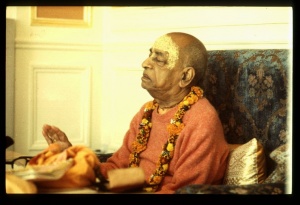CC Antya 1.145: Difference between revisions
m (1 revision(s)) |
(Vanibot #0054 edit - transform synonyms into clickable links, which search similar occurrences) |
||
| (One intermediate revision by one other user not shown) | |||
| Line 1: | Line 1: | ||
{{ | [[Category:Sri Caitanya-caritamrta - Antya-lila Chapter 01|C145]] | ||
<div style="float:left">'''[[Sri Caitanya-caritamrta|Śrī Caitanya-caritāmṛta]] - [[CC Antya|Antya-līlā]] - [[CC Antya 1|Chapter 1: Śrīla Rūpa Gosvāmī's Second Meeting With the Lord]]'''</div> | |||
<div style="float:right">[[File:Go-previous.png|link=CC Antya 1.144|Antya-līlā 1.144]] '''[[CC Antya 1.144|Antya-līlā 1.144]] - [[CC Antya 1.146|Antya-līlā 1.146]]''' [[File:Go-next.png|link=CC Antya 1.146|Antya-līlā 1.146]]</div> | |||
{{CompareVersions|CC|Antya 1.145|CC 1975|CC 1996}} | |||
{{RandomImage}} | |||
==== TEXT 145 ==== | ==== TEXT 145 ==== | ||
<div class="verse"> | |||
<div | :agre vīkṣya śikhaṇḍa-khaṇḍam acirād utkampam ālambate | ||
agre vīkṣya śikhaṇḍa-khaṇḍam acirād utkampam ālambate | :guñjānāṁ ca vilokanān muhur asau sāsraṁ parikrośati | ||
guñjānāṁ ca vilokanān muhur asau sāsraṁ parikrośati | :no jāne janayann apūrva-naṭana-krīḍā-camatkāritāṁ | ||
no jāne janayann apūrva-naṭana-krīḍā-camatkāritāṁ | :bālāyāḥ kila citta-bhūmim aviśat ko ‘yaṁ navīna-grahaḥ | ||
bālāyāḥ kila citta-bhūmim aviśat ko ‘yaṁ navīna-grahaḥ | |||
</div> | </div> | ||
| Line 15: | Line 18: | ||
==== SYNONYMS ==== | ==== SYNONYMS ==== | ||
<div class="synonyms"> | |||
<div | ''[//vanipedia.org/wiki/Special:VaniSearch?s=agre&tab=syno_o&ds=1 agre]'' — in front; ''[//vanipedia.org/wiki/Special:VaniSearch?s=vīkṣya&tab=syno_o&ds=1 vīkṣya]'' — seeing; ''[//vanipedia.org/wiki/Special:VaniSearch?s=śikhaṇḍa&tab=syno_o&ds=1 śikhaṇḍa]-[//vanipedia.org/wiki/Special:VaniSearch?s=khaṇḍam&tab=syno_o&ds=1 khaṇḍam]'' — some peacock feathers; ''[//vanipedia.org/wiki/Special:VaniSearch?s=acirāt&tab=syno_o&ds=1 acirāt]'' — all of a sudden; ''[//vanipedia.org/wiki/Special:VaniSearch?s=utkampam&tab=syno_o&ds=1 utkampam]'' — trembling of the heart and body; ''[//vanipedia.org/wiki/Special:VaniSearch?s=ālambate&tab=syno_o&ds=1 ālambate]'' — takes to; ''[//vanipedia.org/wiki/Special:VaniSearch?s=guñjānām&tab=syno_o&ds=1 guñjānām]'' — of a garland of ''guñjā'' (small conchshells); ''[//vanipedia.org/wiki/Special:VaniSearch?s=ca&tab=syno_o&ds=1 ca]'' — also; ''[//vanipedia.org/wiki/Special:VaniSearch?s=vilokanāt&tab=syno_o&ds=1 vilokanāt]'' — by seeing; ''[//vanipedia.org/wiki/Special:VaniSearch?s=muhuḥ&tab=syno_o&ds=1 muhuḥ]'' — constantly; ''[//vanipedia.org/wiki/Special:VaniSearch?s=asau&tab=syno_o&ds=1 asau]'' — She; ''[//vanipedia.org/wiki/Special:VaniSearch?s=sa&tab=syno_o&ds=1 sa]-[//vanipedia.org/wiki/Special:VaniSearch?s=asram&tab=syno_o&ds=1 asram]'' — with tears; ''[//vanipedia.org/wiki/Special:VaniSearch?s=parikrośati&tab=syno_o&ds=1 parikrośati]'' — goes around crying; ''[//vanipedia.org/wiki/Special:VaniSearch?s=na&tab=syno_o&ds=1 na] u'' — not; ''[//vanipedia.org/wiki/Special:VaniSearch?s=jāne&tab=syno_o&ds=1 jāne]'' — I know; ''[//vanipedia.org/wiki/Special:VaniSearch?s=janayan&tab=syno_o&ds=1 janayan]'' — awakening; ''[//vanipedia.org/wiki/Special:VaniSearch?s=apūrva&tab=syno_o&ds=1 apūrva]-[//vanipedia.org/wiki/Special:VaniSearch?s=naṭana&tab=syno_o&ds=1 naṭana]'' — like unheard-of dramatic dancing; ''[//vanipedia.org/wiki/Special:VaniSearch?s=krīḍā&tab=syno_o&ds=1 krīḍā]'' — of activities; ''[//vanipedia.org/wiki/Special:VaniSearch?s=camatkāritām&tab=syno_o&ds=1 camatkāritām]'' — the madness; ''[//vanipedia.org/wiki/Special:VaniSearch?s=bālāyāḥ&tab=syno_o&ds=1 bālāyāḥ]'' — of this poor girl; ''[//vanipedia.org/wiki/Special:VaniSearch?s=kila&tab=syno_o&ds=1 kila]'' — certainly; ''[//vanipedia.org/wiki/Special:VaniSearch?s=citta&tab=syno_o&ds=1 citta]-[//vanipedia.org/wiki/Special:VaniSearch?s=bhūmim&tab=syno_o&ds=1 bhūmim]'' — within the heart; ''[//vanipedia.org/wiki/Special:VaniSearch?s=aviśat&tab=syno_o&ds=1 aviśat]'' — has entered; ''[//vanipedia.org/wiki/Special:VaniSearch?s=kaḥ&tab=syno_o&ds=1 kaḥ]'' — what; ''[//vanipedia.org/wiki/Special:VaniSearch?s=ayam&tab=syno_o&ds=1 ayam]'' — this; ''[//vanipedia.org/wiki/Special:VaniSearch?s=navīna&tab=syno_o&ds=1 navīna]-[//vanipedia.org/wiki/Special:VaniSearch?s=grahaḥ&tab=syno_o&ds=1 grahaḥ]'' — new ecstatic influence. | ||
</div> | </div> | ||
| Line 23: | Line 25: | ||
==== TRANSLATION ==== | ==== TRANSLATION ==== | ||
<div class="translation"> | |||
<div | " 'Upon seeing peacock feathers in front of Her, this girl suddenly begins trembling. When She sometimes sees a necklace of guñjā [small conchshells], She sheds tears and cries loudly. I do not know what kind of new ecstatic influence has entered the heart of this poor girl. It has imbued Her with the dancing attitude of a player creating wonderful, unprecedented dances on a stage.' | ||
</div> | </div> | ||
==== PURPORT ==== | ==== PURPORT ==== | ||
<div class="purport"> | |||
This verse (''Vidagdha-mādhava'' 2.15) is spoken by Mukharā, a friend of Lord Kṛṣṇa’s grandmother, in a conversation with Paurṇamāsī, the grandmother of Madhumaṅgala. | |||
</div> | |||
<div | <div style="float:right; clear:both;">[[File:Go-previous.png|link=CC Antya 1.144|Antya-līlā 1.144]] '''[[CC Antya 1.144|Antya-līlā 1.144]] - [[CC Antya 1.146|Antya-līlā 1.146]]''' [[File:Go-next.png|link=CC Antya 1.146|Antya-līlā 1.146]]</div> | ||
__NOTOC__ | |||
</div> | __NOEDITSECTION__ | ||
__NOTOC__ | |||
Latest revision as of 19:25, 19 February 2024

A.C. Bhaktivedanta Swami Prabhupada
TEXT 145
- agre vīkṣya śikhaṇḍa-khaṇḍam acirād utkampam ālambate
- guñjānāṁ ca vilokanān muhur asau sāsraṁ parikrośati
- no jāne janayann apūrva-naṭana-krīḍā-camatkāritāṁ
- bālāyāḥ kila citta-bhūmim aviśat ko ‘yaṁ navīna-grahaḥ
SYNONYMS
agre — in front; vīkṣya — seeing; śikhaṇḍa-khaṇḍam — some peacock feathers; acirāt — all of a sudden; utkampam — trembling of the heart and body; ālambate — takes to; guñjānām — of a garland of guñjā (small conchshells); ca — also; vilokanāt — by seeing; muhuḥ — constantly; asau — She; sa-asram — with tears; parikrośati — goes around crying; na u — not; jāne — I know; janayan — awakening; apūrva-naṭana — like unheard-of dramatic dancing; krīḍā — of activities; camatkāritām — the madness; bālāyāḥ — of this poor girl; kila — certainly; citta-bhūmim — within the heart; aviśat — has entered; kaḥ — what; ayam — this; navīna-grahaḥ — new ecstatic influence.
TRANSLATION
" 'Upon seeing peacock feathers in front of Her, this girl suddenly begins trembling. When She sometimes sees a necklace of guñjā [small conchshells], She sheds tears and cries loudly. I do not know what kind of new ecstatic influence has entered the heart of this poor girl. It has imbued Her with the dancing attitude of a player creating wonderful, unprecedented dances on a stage.'
PURPORT
This verse (Vidagdha-mādhava 2.15) is spoken by Mukharā, a friend of Lord Kṛṣṇa’s grandmother, in a conversation with Paurṇamāsī, the grandmother of Madhumaṅgala.